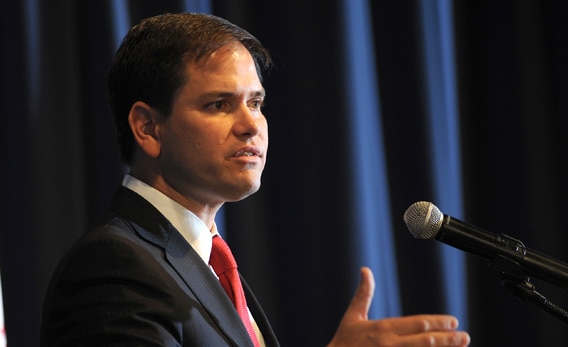Create a free profile to get unlimited access to exclusive videos, sweepstakes, and more!
Marco Rubio Backtracks a Bit on the Age of the Earth

In November, in an interview in GQ magazine, Sen. Marco Rubio (R-Fla.) made an interesting statement about the age of the Earth:
I'm not a scientist, man. I can tell you what recorded history says, I can tell you what the Bible says, but I think that's a dispute amongst theologians and I think it has nothing to do with the gross domestic product or economic growth of the United States. I think the age of the universe has zero to do with how our economy is going to grow. I'm not a scientist. I don't think I'm qualified to answer a question like that. At the end of the day, I think there are multiple theories out there on how the universe was created and I think this is a country where people should have the opportunity to teach them all. I think parents should be able to teach their kids what their faith says, what science says. Whether the Earth was created in 7 days, or 7 actual eras, I'm not sure we'll ever be able to answer that. It's one of the great mysteries.
I took great exception to this, as did many other people. The two points I wanted to make were that, from science, we do in fact know the age of the Earth to great precision, and that science is extremely important to our economic growth. Rubio dismissed a lot of science in his short statement.
However, now he appears to be backtracking. In a second interview, he attempted to clear things up:
The key statement he makes in this interview is: âThe answer I gave was actually trying to make the same point the President made a few years ago, and that is there is no scientific debate on the age of the Earth. Itâs established it pretty definitively; itâs four and half billionâat least four and half billion years old. [â¦] I was referring to the theological debate.â
He then goes on to say that religious people, including himself, can accept the scientific result and still reconcile it with their personal faith.
Let me be clear: The scientific result is correct. If you believe the Earth is only a few thousand years old, you have that right, but you are incorrect. However, I do think that if people can reconcile their religious beliefs with what we know to be true, then more power to them! Seriously, thatâs great. We know a huge amount of information about the Universe due to our scientific investigations over the centuries, and weâre now quite adept at unveiling its secrets. People should be trying to fold that into their own beliefs.
However, I still take exception to Rubioâs comments. Note the last two lines from his first interview, saying weâll never know the true age of the Earth, and itâs one of the great mysteries. That says a lot to me, because itâs not a great mystery. Itâs actually pretty well known through various different scientific processes. Rubio is now saying he was caught off-guard by the question and was referring only to the theological debate, not the scientific one. But itâs telling that for a scientific question, he automatically went to a religious answer, and not a scientific one.
Rubioâs point about agreeing with Obama is interesting. At a forum on religious matters before becoming president, Obama was asked a similar question, and gave a similarâbut not identicalâanswer (and truth be told, I feel the same way about the religious parts of his answer as I do Rubioâs). But if you read the transcripts of that interview to get the context, youâll find Obama also goes on to give a lot of credence to science, saying for example he thinks evolution is true and global warming is real, and people should try to reconcile their own beliefs to those realities. Since that time he has been clear that scientists need to be able to investigate the world âfree from manipulation and coercionâ and has generally supported science.
Note, importantly, that Obama was asked this question in a religious setting, yet still supported scienceâhe went out of his way to do so. When Rubio was asked the same question in a secular setting, he turned to religion. While some people (including Slateâs own Daniel Engber) see an equivalence between the two answers, the context shows there is in reality a huge gulf between them.
Itâs important to note that in the second interview, Rubio also says that science should be taught in school and people should still be free to believe what they want. I agree, but this is a very, very thorny issues, and despite the First Amendment to the Constitution being clear about it, a lot of religious politicians want to mandate the teaching of religious belief as fact in the public schools. I want a leader for this country who turns to science first in a situation like that.
I am somewhat mollified by Rubioâs follow-up comments, but given his initial statement, I will continue to watch him with a very skeptical eye. Given that he is one of the media darlings for the Republican nomination for the 2016 Presidential race, we all should watch him with a skeptical eye.


























